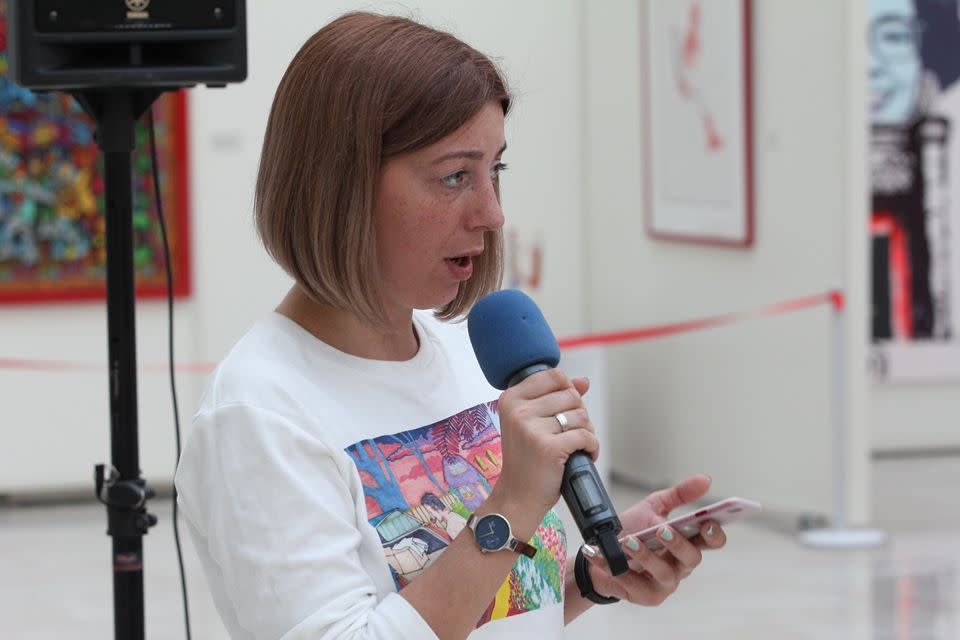Ukrainian journalist forced to flee following threats from far-right

An independent journalist writing about alleged links between Facebook, a local fact-checking organisation, and far-right groups, has been forced to flee Kiev after receiving death threats.
Ekaterina Sergatskova, 30, a Russian-born, Ukrainian nationalised citizen, is editor of the well-regarded Zaborona publication, which focuses on matters often ignored by Ukrainian media including nationalism and the far-right.
On July 3, Ms Sergatskova co-authored an investigation alleging links between neo-nazi groups and StopFake, a Ukrainian NGO working as a Facebook fact-checking partner.
The report detailed several instances of one of the NGO’s public faces fraternising with musicians from Holocaust-denying, White Power bands. It suggested such links could have served as a reason for Facebook removing an earlier Zaborona article about far-right activist Denis Nikitin.
StopFake responded to the allegations with a statement saying it was never authorised to block materials, and rejected the claims against it as a Russian conspiracy.
The article also brought an immediate reaction from the hard-right — both publicly on social media and privately, in messages sent to the journalist.
On Saturday, Roman Skrypin, a popular, nationalist-leaning journalist, upped stakes by publishing pictures of Ms Sergatskova and her five-year-old son, together with photographs of what he believed to be her home. He accused the journalist of being an agent of the Kremlin, a description friends of the journalist dismiss as absurd.
In comments responding to Mr Skrypin’s Facebook post, users threatened all kinds of retribution, and published details of her supposed address.
The original Facebook post and comments by far-right figures have since been deleted following multiple complaints. But additional offensive posts by the same journalist remain untouched. “You block one post,” Mr Skyrpin wrote, “and I’ll write ten more.”
Ms Sergatskova left the Ukrainian capital with her family on Monday evening, citing fears for her life.
Those fears are not inconsistent with a history of extreme violence from Ukraine’s far-right fringe, and concerns about links between neo-nazi groups and law enforcement.
In 2015, Oles Buzyna, a pro-Russian journalist and writer was murdered a day after his address was leaked along with hundreds of other journalists by a website connected to the Ukrainian interior ministry.
A year later, the Pavel Sheremet was assassinated in his car in central Kiev. An official investigation has so far failed to produce convincing suspects, though another investigation conducted by journalists implied the security services may know something about it.
Ms Sergatskova told The Independent she has reported the threats to police, but does not expect real protection.
“We don’t feel safe and the bureaucrats are silent,” she said. “How can you feel secure knowing just how closely the far right are connected to the police and security services?”
Anton Shekhovtsov, an external lecturer at the University of Vienna and expert on far-right movements in Eastern Europe, agreed the state was not “systemically pushing back” against nationalist movements.
That said, it was sometimes difficult to “disentangle active participation from infiltration.” “It’s not always clear the government is doing something, but they do infiltrate and they do take some of the more extreme organisations down,” he said.
The Ukrainian far-right was a “motley group,” he added. “The groups that the Interior Ministry is involved with are not the same as the groups like C14 mentioned in the Zaborona piece.”
C14, a far-right organisation included in the Israeli and American anti-terrorist bases, has been suspected of several serious crimes, including violence against the Roma community and murder of Oles Buzyna.
Zaborona suggested the StopFake fact-checking NGO had links to the group via Marco Suprun, a regular presenter on its YouTube channel.
Mr Suprun, the Canadian husband of Ukraine’s former health minister, was shown sharing platforms with former C14 members and other far-right figures, including one convicted of a racially-motivated murder.
Yevhen Fedchenko, director of StopFake and the journalism school at Kiev’s Mohyla Academy, has also previously tweeted in support of C14.
Speaking with The Independent, Mr Fedchenko said he had no comment to make, and intended to take the case to court.
“That will be the place for clarification,” he said. “These are serious allegations.”

 Yahoo News
Yahoo News 